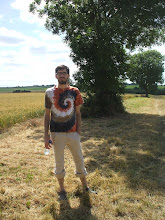Part 1. Many Christians believe that Jesus was both fully human and fully divine. Is this a coherent doctrine, though? Consider this argument:
P1: An essential feature of the human predicament is not knowing with absolute certitude whether or not God exists. Indeed, this feature is not only not knowing for sure whether a God exists, but which one exists if He does (viz., is the existent Deity that belonging to Islam, or Christianity, etc.?). (Note that while neither the theist nor the atheist can answer the question of God's existence with absolute certitude, one can still assign a probability value to the corresponding proposition, given the available evidence. As far as I can tell, the probability of any God existing seems rather low, at least at the moment.)
P1.2: In order to be fully human, therefore, it seems that the individual in question must be able to legitimately doubt the existence of God. In fact, one finds such doubt not just among atheists, but among the most pious advocates of Christianity as well (e.g., Mother Teresa).
P2: As a fully divine being (Hebrews 4:15, John 1:14, 1 John 4:1-3, 2 John 7-11, etc.), Jesus could not possibly have doubted the existence of God. Indeed, he knew with absolute certitude not only that God exists, but that this existent God was/isthat belonging to the Bible (although couching it like this is a bit anachronistic, given that the Bible was assembled after Jesus' death).
C: It follows, therefore, that Jesus could not have been fully human since, as a fully divine being, doubting the existence of God for him would have been metaphysically impossible.
Part 2. This also puts Jesus' passion in dubious light, I believe. There are, roughly speaking, two reasons that people fear death: (1) one might fear the pain associated with the act or process of dying; and (2) one might fear the possibility of spending eternity in hell (this is presumably what leads to death-bed conversions). If Jesus were fully divine and couldn't have doubted the existence of God -- not to mention the eternal fate of His soul -- then Jesus wouldn't have been preoccupied by the second source of death-related anxiety just specified. What a relief for Jesus Christ! A couple days of extreme human pain ending in -- He knew for sure -- eternal life in heaven. That's not too bad an epistemic situation to be in, if you ask me.
But what about the first source? Interestingly, psychological studies have shown that pain perception can be modulated by one's situation, or understanding of the situation. For example, soldiers in WWI dealt with the pain of losing a limb amazing well, as Melzack and Wall (1984) report. Putting myself in Jesus' place, then, I find it rather difficult to believe that I would really be suffering all that much during my crucifixion. How could I, after all, knowing with absolute certitude that beyond this momentary episode of human pain lies eternal life in indescribable bliss? And indeed, if Jesus couldn't of been fully human, in what sense could He have really experience human pain?
Ted Johnston writes HERE: "That Jesus is both God and human is a mystery beyond our limited experience." Falling back on the "mystery" of Christian doctrine is, of course, one of the most intellectually dishonest and facile moves one could make. It is tantamount to giving up on making clear a muddy issue. Saying that "it is a deep, spiritual mystery how the invisible elephant living in my closet manages to be so quiet when others are around" is patent nonsense. Mystery is not an excuse to keep believing some proposition p, but rather is a reason to reject believe p. In contrast, science constitutes a highly sophisticated strategy (as Godfrey-Smith calls it) for converting mystery into understanding -- that is, for transforming nescience (ignorance) into science (knowledge). As fallible as science may be (e.g., study the history of science and then extrapolate to currently accepted paradigms), it nonetheless appears to be by far the best mode of acquiring knowledge about our universe that we have.
Part 3. Finally, a crucial point about atheism. Atheism is not a dogma. It is the conclusion of a logical argument that begins with the available empirical evidence. I don't think the prominent exponents of "New Atheism" emphasize enough that, as intellectually honest individuals, if God were to suddenly make Himself known, or provide some irrefragable bit of evidence for His existence, then these paragons of atheistic thought would promptly abandon their Godless worldviews and adopt a thoroughly theistic posture. Indeed, this would be the scientific thing to do.
Put differently, I -- as an atheist -- would quite happily convert to theism if only there were sufficient evidence to support the theistic hypothesis. As far as I can tell, though, maintaining a scientific stance that puts truth before what I want or desire to be the case, no such evidence has been or even is adducible. But I am always open to such theism-supporting evidence. The flexibility that intellectual honesty entails thus constitutes a significant difference between the rational atheist and the dogmatic zealot.
October 9, 2009
Jesus the Atheist
Labels:
Bible,
Comma Johanneum,
delusion,
Jesus,
modalism,
Ted Johnston,
tritheism
Subscribe to:
Comments (Atom)
